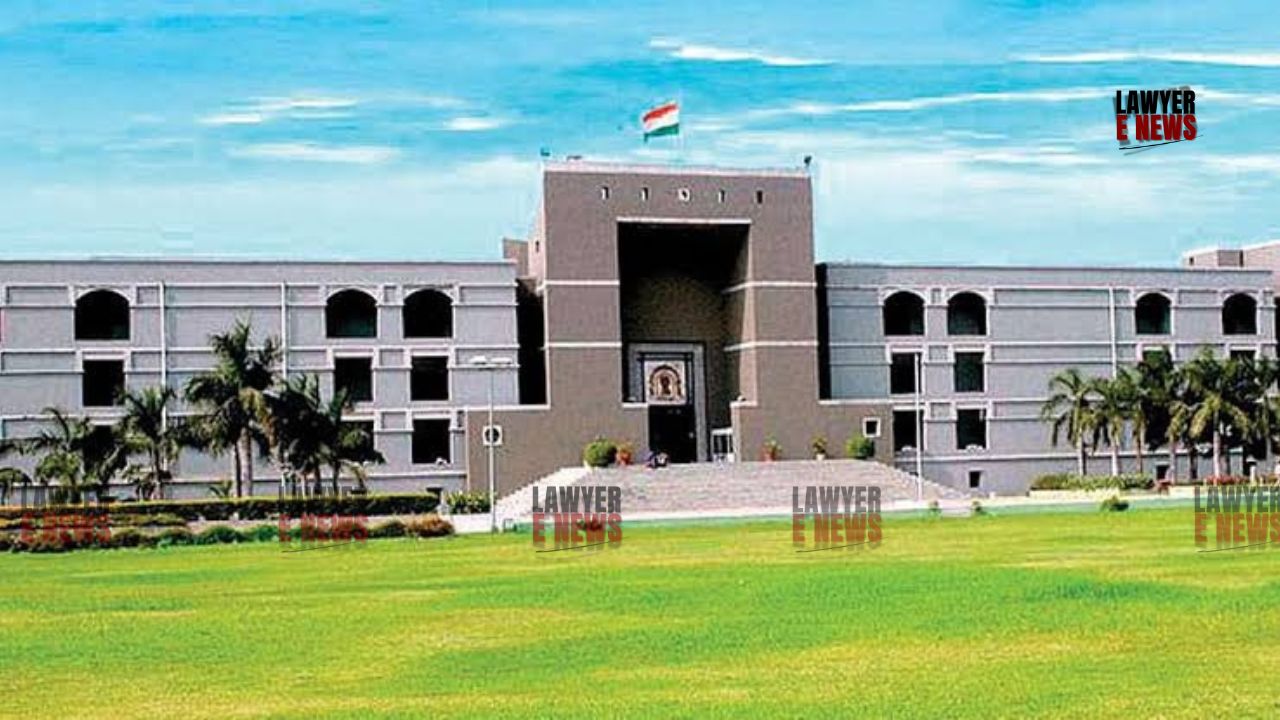-
by Admin
15 February 2026 5:35 AM



Gujarat High Court denied leave to appeal against consent decrees obtained by the respondents in two connected civil suits. The Court ruled that the applicant, relying on an unregistered Agreement to Sell, had no enforceable interest or legal standing to challenge the decrees.
The Bench of Honourable Justice Sangeeta K. Vishen and Honourable Justice Niral R. Mehta observed: "An agreement for sale, under Section 54 of the Transfer of Property Act, 1882, does not create any title or interest in immovable property. Therefore, the applicant, merely holding such an agreement, cannot qualify as an aggrieved person with an appealable interest."
The applicant, Nayankumar Bhagvanbhai Patel Mevda, sought leave to appeal under Section 96(1) of the Code of Civil Procedure (CPC) against two consent decrees:
Special Civil Suit No. 277 of 2022: Filed by respondents against Respondent No. 10 to cancel an alleged Agreement to Sell dated January 1, 2013.
Special Civil Suit No. 11 of 2023: Filed by Respondent No. 10 seeking specific performance of the January 1, 2013 Agreement to Sell.
Both suits were disposed of through compromise decrees, and subsequent sale deeds were executed under court orders.
The applicant contended that he was prejudiced by the decrees as he held a registered Agreement to Sell dated March 17, 2022, in respect of the same property, for which he had already paid ₹50 lakhs in consideration. The applicant alleged that the suits and consent decrees were fraudulent, designed to nullify his rights, and filed without his knowledge.
The Court reiterated that an Agreement to Sell does not create any interest in immovable property, as per Section 54 of the Transfer of Property Act, 1882, and Section 17 of the Registration Act, 1908. The Court cited the landmark judgment in Suraj Lamp & Industries Pvt. Ltd. v. State of Haryana, (2012) 1 SCC 656, which held:
"A transfer of immovable property by way of sale can only be made by a registered instrument. An agreement to sell does not confer title or interest in the property."
The Court concluded that the applicant’s claim, based on an unregistered Agreement to Sell, was speculative and contingent, lacking any enforceable interest.
To qualify as an "aggrieved party" under Section 96(1), CPC, the Court noted that a person must demonstrate that the impugned decree has caused a direct legal injury or affected their rights. The Court cited the principles outlined in Patel Vinodbhai Khodidas v. Patel Pravinbhai Kacharabhai, 2021 (3) GLR 2601:
"An appealable interest must be substantial, immediate, and enforceable. Contingent or speculative interests do not qualify as legal aggrievement."
Since the applicant’s interest was derived solely from an unenforceable Agreement to Sell, the Court held that he could not be considered an aggrieved person.
The Court affirmed that a consent decree is binding on the parties to the compromise and cannot be challenged by non-parties unless they demonstrate a direct legal injury. The Court relied on Pushpa Devi Bhagat v. Rajinder Singh, (2006) 5 SCC 566, which held:
"No appeal is maintainable against a consent decree under Section 96(3), CPC, and no independent suit can be filed to challenge such a decree under Order 23 Rule 3-A, CPC."
However, the Court clarified that third parties who are not bound by a consent decree may file an appeal with leave of the court under Section 96(1), CPC, provided they have an appealable interest. In this case, the applicant failed to satisfy this requirement.
The Court noted that the applicant had already filed Special Civil Suit No. 299 of 2023, seeking specific performance of his Agreement to Sell. It held that the applicant should pursue this independent remedy rather than seeking to challenge the consent decrees. The Court emphasized:
"The applicant must establish his rights independently in his pending suit for specific performance."
The applicant alleged that the respondents had committed fraud by filing suits and obtaining consent decrees to prejudice his rights. However, the Court held that allegations of fraud must be pleaded and proved in a separate proceeding. It observed:
"Fraud cannot be presumed; it must be specifically pleaded and proved."
The Court dismissed both applications, holding that the applicant lacked the legal standing or appealable interest required to challenge the consent decrees. It directed the applicant to pursue his pending suit for specific performance in accordance with law.
Clarification on Third-Party Appeals Against Consent Decrees: The judgment underscores the limited circumstances under which third parties can challenge consent decrees and highlights the importance of demonstrating an enforceable legal interest.
Reiteration of Legal Principles on Agreement to Sell: The Court reaffirmed that an Agreement to Sell does not confer any title or interest in immovable property, limiting the rights of agreement holders to seek specific performance through independent suits.
Emphasis on Judicial Economy: By directing the applicant to pursue his specific performance suit, the Court emphasized the need to avoid duplicative or speculative litigation.
Date of Decision: January 16, 2025
